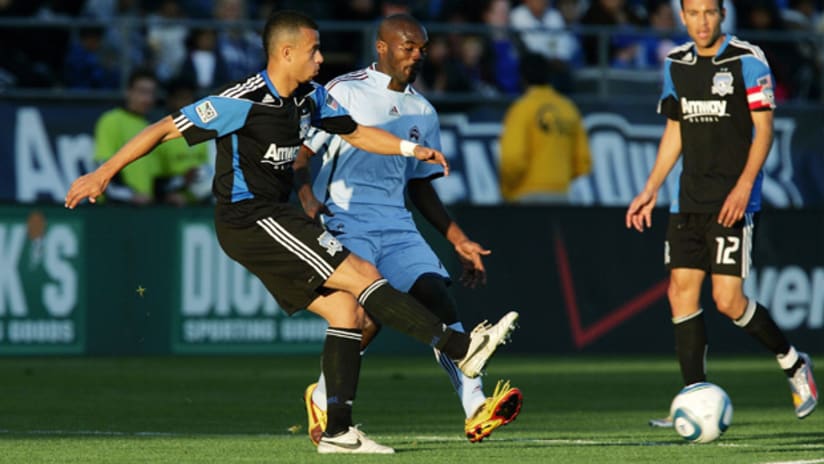After two years of searching—mostly in vain—for victories, the San Jose Earthquakes aren’t willing to indulge complaints about the manner in which wins are finally being provided.
So when the Quakes conceded the majority of play in what turned out to be a 1-0 decision over Colorado on Saturday, coach Frank Yallop offered no apologies for forsaking the beauty of the Rapids’ multi-layered buildups in favor of two touches and a hopeful lead pass. After all, it was a long ball from left back Ramiro Corrales—redirected slightly by a failed trap from Ryan Johnson—that fell to the feet of Chris Wondolowski, who pounded it home in the 33rd minute for the game’s only goal.
“We’re not really a long, 20-pass-possession team,” Yallop said. “We’re more of an up, back and then try to get a break, especially at home. I said at halftime, we can’t try to play like they play; we don’t play like that. We haven’t got the horses to do that. We’re more direct.
“When we’re aggressive going to the ball and going forward, we’re a good team. If we try to play a different style, I think we’d look poor.”
It’s not that the Quakes won’t take control when they get the chance, as they did against a New England team that was missing its midfield engine, Shalrie Joseph. San Jose won that match, 2-0. But those instances have been few so far this season.
“I think there’s going to be games where you have possession and you play well,” Quakes general manager John Doyle said. “And there’s going to be games where you don’t have possession and you have to adjust. I do think that we adjusted pretty well to it [against Colorado], and didn’t try to play to a fault, to where you’re going, ‘No matter what happens, we’re going to play possession. We’re going to lose it in our own third and I don’t care. We’re gonna stick to it.’”
Part of the Quakes’ reliance on longer passes stems from who they’ve played; teams such as Real Salt Lake and Chivas USA [both of whom beat San Jose] thrive on flooding the midfield with extra personnel compared to a Quakes side that primarily uses an orthodox 4-4-2 set.
Part of it also can be traced to the use of Brandon McDonald as a holding midfielder. McDonald has strong instincts when it comes to tackling and breaking up an opponent’s plays, but has not yet shown equal facility building up pressure incrementally.
“For us to work it through the midfield, we don’t have three guys in there,” Yallop said. “We have two strong characters in there, Brandon and Andre [Luiz]. ... At this point, we look like we are a team that’s going to create chances by playing the ball forward as early as possible. It’s not smashing it long, but it’s getting it to the forwards.”
One of the requirements to play that style, however, is to have a defense that can withstand the repeated attempts by an opposition—emboldened with the extra possession—to break it down. How much pressure does that put on a back line, exactly?
“Tons,” center back Jason Hernandez told MLSsoccer.com before laughing. “It can feel a bit overwhelming at times, when wave after wave of attacks are coming, and you feel like you’re non-stop defending, but we’re willing to take on that responsibility. We’ve reaped the rewards of that our past few performances, where it hasn’t been the prettiest of soccer and we’ve gotten results, we’ve gotten three points.”
That San Jose, who gave up a league-worst 50 goals last season, would feel comfortable putting that kind of pressure on their defenders is a fascinating turnabout. Certainly, the Quakes’ back four—back five, really, given how deep McDonald was circling—made Yallop’s decision look like pure genius on Saturday, holding Colorado to a mere handful of potential chances, and only one real threat—a cracking 20-yard shot from Wells Thompson that Joe Cannon was able to parry and eventually cover.
In a 3-2 loss to Chivas, as Doyle pointed out, the Quakes lost their shape defensively, especially in the midfield.
“Brandon’s trying to hunt people down, Ramon [Sanchez] is trying to too, and they’re leaving that area [unguarded]," Doyle said.
Against Colorado, on the other hand, the Quakes maintained their discipline, even as the Rapids kept probing.
“I felt like we were extremely organized,” right back Chris Leitch said. “There was constant communication. We were close enough that we could communicate in little 5-yard movements. Everything we work on, shape-wise, was there.”
Geoff Lepper covers the Earthquakes for MLSsoccer.com. He can be reached at sanjosequakes@gmail.com. Follow him on Twitter: @sjquakes.


